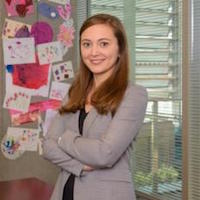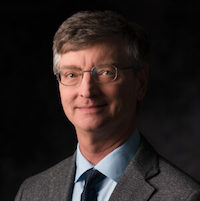Weird Ways to Compute Task Force
The Weird Ways to Compute task force was created in fall 2021 to lead activities related to the development of future computing architecture and systems, in order to achieve major goals such as overcoming the end of Moore’s Law and improving high performance computing systems.
Current Members
 Nadya Bliss
Nadya Bliss
CCC Vice Chair
Arizona State University
Nadya Bliss
 Dr. Nadya T. Bliss is the Director of the Global Security Initiative (GSI) at Arizona State University. GSI serves as the university-wide hub addressing emerging security challenges, including borderless threats (cyber security, health security, and resource security). These challenges are often characterized by complex interdependencies and present conflicting objectives requiring multi-disciplinary research and cross-mission collaboration. Prior to taking on the GSI role, Dr. Bliss served as the Assistant Vice President, Research Strategy in the Office of Knowledge Enterprise Development.
Dr. Nadya T. Bliss is the Director of the Global Security Initiative (GSI) at Arizona State University. GSI serves as the university-wide hub addressing emerging security challenges, including borderless threats (cyber security, health security, and resource security). These challenges are often characterized by complex interdependencies and present conflicting objectives requiring multi-disciplinary research and cross-mission collaboration. Prior to taking on the GSI role, Dr. Bliss served as the Assistant Vice President, Research Strategy in the Office of Knowledge Enterprise Development.
Dr. Bliss holds a Professor of Practice appointment (and is a member of Graduate Faculty) in the School of Computing, Informatics, and Decision Systems Engineering; Senior Sustainability Scientist appointment in the Julie Ann Wrigley Global Institute of Sustainability; and affiliate appointments in the School for Future of Innovation in Society, the Center on the Future of War (collaboration between ASU and New America), and the Simon A. Levin Mathematical, Computational and Modeling Sciences Center. Dr. Bliss is also a Senior Fellow at New America. Before joining ASU in 2012, Dr. Bliss spent 10 years at MIT Lincoln Laboratory, most recently as the Group Leader of the Computing and Analytics Group.

Tom Conte
Georgia Institute of Technology
Tom Conte
 Tom Conte is a native of Delaware, but served his time in a corn field in the middle of Illinois, escaping only when he received his Ph.D. from the University of Illinois at Urbana-Champaign in 1992. From 1992-1995, he was an Assistant Professor at the University of South Carolina in Columbia, SC, where he met his wife (which was just about the only good thing that happened to him in South Carolina).
Tom Conte is a native of Delaware, but served his time in a corn field in the middle of Illinois, escaping only when he received his Ph.D. from the University of Illinois at Urbana-Champaign in 1992. From 1992-1995, he was an Assistant Professor at the University of South Carolina in Columbia, SC, where he met his wife (which was just about the only good thing that happened to him in South Carolina).
In 1995, Conte moved to NC State University (in Raleigh, NC), where he was an Assistant Professor (1995-1998), then an Associate Professor (1998-2002), and then an adjective-free Professor of Electrical and Computer Engineering . Somewhere in there (2000-2001) he took a short detour to DSP startup BOPS, inc. to serve as a manager of their back and compiler group and “Chief Microarchitect” (because they already had a “Chief Architect”). After cursing Computer Science as a faux discipline for decades, he accidentally became a professor of Computer Science at Georgia Tech, where he suffers to this day.
Conte currently directs a bunch of Ph.D. students in topics ranging from compiler design to advanced microarchitectures. His research is or has been supported by DARPA, Compaq (formerly Digital), Hewlett-Packard (formerly Compaq), IBM, Intel, TI, Sun, NASA, and the National Science Foundation.
 Ian Foster
Ian Foster
University of Chicago
Ian Foster

Ian Foster is Distinguished Fellow and director of the Data Science and Learning Division at Argonne National Laboratory. He is also the Arthur Holly Compton Distinguished Service Professor of Computer Science at the University of Chicago. Ian received a BSc (Hons I) degree from the University of Canterbury, New Zealand, and a PhD from Imperial College, United Kingdom, both in computer science. His research deals with distributed, parallel, and data-intensive computing technologies, and innovative applications of those technologies to scientific problems in such domains as climate change and biomedicine. His Globus software is widely used in national and international cyberinfrastructures. Foster is a fellow of the American Association for the Advancement of Science, the Association for Computing Machinery, and the British Computer Society. His awards include the Global Information Infrastructure Next Generation award, the British Computer Society’s Lovelace Medal, the IEEE’s Kanai award, and honorary doctorates from the University of Canterbury, New Zealand, and the Mexican Center for Research and Advanced Studies of the National Polytechnic Institute (CINVESTAV). He was a co-founder of Univa, Inc., a company established to deliver grid and cloud computing solutions.
 William D. Gropp
William D. Gropp
University of Illinois Urbana-Champaign
William D. Gropp

William Gropp received his B.S. in Mathematics from Case Western Reserve University in 1977, a MS in Physics from the University of Washington in 1978, and a Ph.D. in Computer Science from Stanford in 1982. He held the positions of assistant (1982-1988) and associate (1988-1990) professor in the Computer Science Department at Yale University. In 1990, he joined the Numerical Analysis group at Argonne, where he was a Senior Computer Scientist in the Mathematics and Computer Science Division, a Senior Scientist in the Department of Computer Science at the University of Chicago, and a Senior Fellow in the Argonne-Chicago Computation Institute. From 2000 through 2006, he was also Deputy Director of the Mathematics and Computer Science Division at Argonne. In 2007, he joined the University of Illinois at Urbana-Champaign as the Paul and Cynthia Saylor Professor in the Department of Computer Science. From 2008 to 2014 he was the Deputy Director for Research for the Institute of Advanced Computing Applications and Technologies at the University of Illinois. In 2011, he became the founding Director of the Parallel Computing Institute. In 2013, he was named the Thomas M. Siebel Chair in Computer Science. In 2016, he was appointed as Acting Director of the National Center for Supercomputing Applications (NCSA), and in 2017, became Director of NCSA. His research interests are in parallel computing, software for scientific computing, and numerical methods for partial differential equations. He has played a major role in the development of the MPI message-passing standard. He is co-author of the most widely used implementation of MPI, MPICH, and was involved in the MPI Forum as a chapter author for MPI-1, MPI-2, and MPI-3. He has written many books and papers on MPI including “Using MPI” and “Using MPI-2”. He is also one of the designers of the PETSc parallel numerical library and has developed efficient and scalable parallel algorithms for the solution of linear and nonlinear equations. With the other members of the PETSc core team, he was awarded the SIAM/ACM Prize in Computational Science and Engineering in 2015. Gropp is a Fellow of AAAS, ACM, IEEE, and SIAM, and a member of the National Academy of Engineering. He received the Sidney Fernbach Award from the IEEE Computer Society in 2008, the SIAM-SC Career Award in 2014, and the Ken Kennedy Award from the ACM and the IEEE Computer Society in 2016..
Resources curated for this task force include:
- Infrastructure for Artificial Intelligence, Quantum and High Performance Computing white paper
- Thermodynamic Computing workshop report
- The Opportunities and Challenges for Next Generation Computing white paper
- Challenges to Keeping the Computer Industry Centered in the US white paper (draft)
- The 21st Century Computer Architecture in 2012 white paper
- The Future of Computing Performance: Game Over or Next Level? white paper
- Nanotechnology-Inspired Information Processing Systems workshop report
- Workshops on Extreme Scale Design Automation (ESDA) Challenges and Opportunities for 2025 and Beyond workshop report
Workshops related to this task force include:
- Physics & Engineering Issues in Adiabatic/Reversible Classical Computing workshop
- Wide-Area Data Analytics workshop
- Thermodynamic Computing workshop
- Nanotechnology-Inspired Information Processing Systems workshop
- Extreme Scale Design Automation workshop series
- 2025 Roundtable






